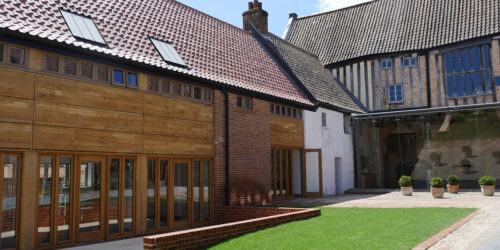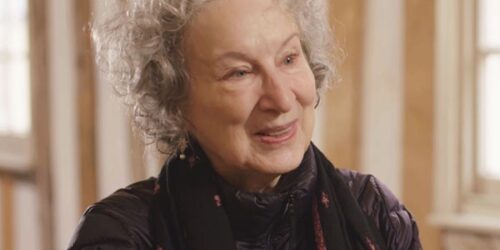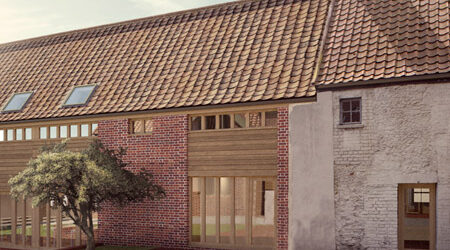
To celebrate the launch of the National Centre for Writing in Norwich we commissioned new work from acclaimed performance poet Luke Wright.
Luke has a long history with the city and the organisation. A graduate of the University of East Anglia, he worked at Writers’ Centre Norwich (now the National Centre for Writing) as a Live Literature Co-ordinator until 2009. He has since worked with us on various education projects and we supported him to create the show ‘What I learned from Johnny Bevan’, which won a First Fringe Award.
Alongside his own shows, Luke is John Cooper Clarke’s regular support act, performing to crowds of 2,000 people at venues such as The London Palladium and The Palace Theatre in Manchester. He has published four books, regularly appears on BBC Radio Four and has won numerous awards.
Read more about his work with the National Centre for Writing here.
Continue reading for the story behind Luke’s rich, evocative poem.
Here
And so they built it here
this city of incomers and refugees
where Boudicca’s chariot [1]
first asserted her cause of public liberty.
[1] Before the Romans invaded Iron Age Britain in AD 43, Norfolk had been the territory of the Iceni people. The most famous leader of this tribe, Boudicca, led an unsuccessful revolt against the Roman occupation in around AD 60. For a closer look at Norwich’s rich history, head to the Visit Norwich website.
They built it here because
our rivers run with ink, [2]
enduring love [3] and dark materials. [4]
[2] The river Wensum runs through Norwich. Historically the river was used for the transportation of goods and trade, helping Norwich to become England’s second biggest city.
[3] Enduring Love is a novel by Ian McEwan (born 1948). McEwan was the first graduate of MA Creative Writing at UEA and has gone on to be a critically acclaimed best-selling author of novels including Atonement and Amsterdam. In 2016, McEwan returned to Norwich for an event at St Andrews’ Hall in celebration of his latest novel Nutshell.
[4] Phillip Pullman (born October 1946), author of the bestselling fantasy trilogy ‘His Dark Materials’ was born in Norwich.
This place of language [5], pubs [6] and churches [7]
of ballads, plays and verses [8]
where Dame Julian dared to conjured God as Mother. [9]
[5] The British Centre for Literary Translation was founded in Norwich in 1989 by one of Europe’s greatest writers WG (Max) Sebald, who taught at UEA from 1969 until his sudden death in 2001. In 2015, the National Centre for Writing took over the public aspects of the BCLT’s programme, with Arts Council support.
[6] They used to say that Norwich had a pub for every day of the year. Nowadays, the city is joint third in the country for the number of pubs per square mile. Two of our most historic are the Adam and Eve on Bishopgate, and The Gardeners’ Arms on Timber Hill – known by locals as the Murderers’.
[7] Norwich was also said to have a church for every Sunday of the year, and is still home to not one, but two cathedrals! Norwich Cathedral is one of the finest complete Romanesque cathedrals in Europe, with the second tallest spire (315ft) and largest monastic cloisters in England. The Catholic Cathedral of St John the Baptist, designed by George Gilbert Scott Junior, is a fine example of the great Victorian Gothic Revival.
[8] One of our first projects after Norwich’s designation as England’s first UNESCO City of Literature was the publication of work by England’s only 13th century medieval Hebrew poet, Meir ben Elijah. His work lay lost in the Vatican Archives for many centuries. Although not a great deal is known about him; we know he wrote and lived in Norwich during the 1290s. Into the Light: The Medieval Hebrew Poetry of Meir of Norwich is available to buy here.
[9] Dame Julian of Norwich (1342-1416) was one of Europe’s great mystics, and the first woman to be published in English. Her famous text, Revelations of Divine Love, was written from an anchorite cell in St Julian’s church, just a few feet away from the National Centre for Writing.
Here where they threw wide the library doors
and said these shelves, these books, these words are yours. [10]
[10] The first civic provincial library was established in Norwich in 1608. Norwich was also the first city to implement the Public Library Act of 1850. The Norfolk & Norwich Millennium Library, based in the glass-fronted Forum in the city centre, has regularly topped lists for highest footfall and most loaned books compared to any other public library in the UK.
Here where we du diffrunt,[11] gob and lip
the job lot of us struck off the papal list. [12]
[11] ‘Do different’ is the motto of the University of East Anglia, originating from the old Norfolk saying ‘People in Norfolk do things different’. ‘Du diffrunt’ should, of course, be pronounced with a Norfolk dialect!
[12] Norwich is the only English city to have been excommunicated by the pope. The city’s people were at odds with the cathedral monks for years, mostly about rights and boundaries. Then in 1272, there was a confrontation, where one church servant shot a man with a crossbow and the authorities had two others arrested. In the weeks afterward, the pope delivered his excommunication and further church violence riled the people into riots. The king arrived to settle the conflict, forcing the city to pay the church £2,000 and for citizens to build the Ethelbert Gate.
Here where the Wensum meets the Yare [13]
looking east to Europe.
Here where we fight for what is fair [14]
the rights of man and woman. [15]
[13] Norfolk is one of few counties that does not contain any stretches of motorway. Before the introduction of the railway, it was quicker to get from Norwich to Amsterdam by sea than to London by road.
[14] Norwich has a long-established reputation for revolution, progression and refuge. Famous figures such as Thomas Buxton, Elizabeth Fry and Harriet Martineau all fought for the abolition of the slave trade. In 2006, Norwich became the first UK city to join the International Cities of Refuge Network (ICORN) which was formed to promote free speech and support persecuted writers. Our Chief Executive Chris Gribble is its chair.
[15] Dorothy Jewson, born in 1884 and educated at Norwich High School for Girls until 1903, became one of the founding members of the Norwich branch of the Women’s Social and Political Union. In 1923, she was elected MP for Norwich, becoming one of the first few female MPs, and used her maiden speech to bring down the voting age for women to 21, which went ahead five years later.
Here the home of Hansard [16]
and the first local rag [17]
where hacks first dispatched in ink
the savagery of battle.
[16] Luke Hansard (1752 – 1828) was an English printer, born in St Mary’s parish, Norwich. He printed the Journals of the House of Commons from 1774 until his death.
[17] The first provincial newspaper was established in Norwich in 1701.
Here the home of Martineau, [18]
of Bale, [19] Borrow, [20] Fry [21] and Sewell [22]
a plus ton of languages
darned with dialect
and printed on the page. [23]
A thousand years of love and genius and rage
dispatched from this place
to change the world beyond. [24]
And so they built it here.
[18] Harriet Martineau (1802 – 1876) was born in Norwich of Huguenot descent. She was one of the world’s first female journalists.
[19] John Bale (1495 –1563) was an English churchman, historian and controversialist, and Bishop of Ossory. At the age of twelve, he joined the Carmelite friars at Norwich. He then wrote the oldest known historical verse drama in English, on the subject of King John.
[20] George Borrow (1803-1881) was born in East Dereham, Norfolk, had part of his education at Norwich Grammar School, and spent much of his life in East Anglia. He became a best-selling author with The Bible in Spain (1843), a brilliant account of five remarkable years spent in the Peninsula. He also wrote other works, as well as writing poetry.
[21] Norwich shares a connection with two famous Fry’s. Elizabeth Fry (1780 –1845) was an English prison reformer, social reformer and philanthropist. She campaigned for better conditions for female prisoners and also for those sentenced to transportation. Fry was the driving force in legislation to make the treatment of prisoners more humane. Since 2002, she has been depicted on the Bank of England £5 note. Writer, actor, presenter, comedian and activist Stephen Fry (1957) is a former City College Norwich student and former board member at Norwich City Football Club. When independent bookshop The Book Hive opened in 2009, he called it ‘the kind of place I dreamt of existing in Norwich when I was growing up.’
[22] Anna Sewell (1820—1878) lived in Norwich and wrote the bestseller Black Beauty (1877), originally published by Jarrold & Sons and has sold over 50 million copies.
[23] There are 27 independent publishers based in Norwich (and eight more in the county), including Propolis Books, Galley Beggar Press, Gatehouse Press, Eggbox Publishing and Strangers Press. This represents 5% of the UK’s independent publishing sector and relative to the region’s low population, a higher percentage than anywhere else in the country outside of London.
[24] Writers from Norwich have changed the world. Born south of Norwich, Thomas Paine’s Common Sense treatise influenced the course of the American Revolution. His Rights of Man is also one of the most widely read books of all time. Others, such as celebrated polymath Thomas Browne, also called Norwich their home.
You may also like...
National Centre for Writing launches in Norwich
New centre to champion literary translation, artistic experimentation and collaboration.

18th June 2018
Margaret Atwood on hope, Trump and season 2 of The Handmaid’s Tale
Exclusive Margaret Atwood interview

18th May 2018
Atwood, Coetzee and Smith back new National Centre for Writing
Building work starts at Dragon Hall in Norwich

8th October 2017






